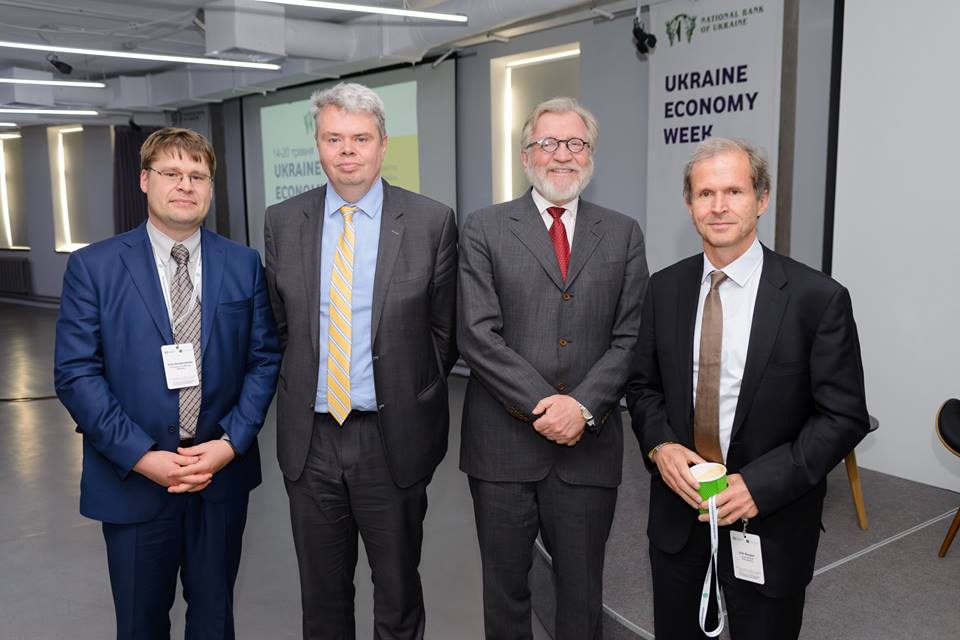Erik Berglof on why the transition of Ukraine to a market economy has been delayed; can paternalism be useful; what can become the driver of the Ukrainian economy; when foreign investments will come to Ukraine; what should Ukraine do with the difficult neighborhood of Russia and how poor countries can avoid getting into the populism trap
Is Ukraine still in transition? Is there such a term – countries in transition? Is it still used?
I now prefer to use the word “transformation” or “structural transformation” implying fundamental and interdependent changes in both economic structures and associated institutions. All countries experience transformation – advanced as well as developing ones. We are living in an age of rapid technological transformation and closely related social transformation. We have to adjust under tightening ecological and social constraints which in themselves force us to change. So, transformation is always taking place everywhere.
Transition has been applied to the economic and political transformation in Eastern Europe when countries moved from socialism to democracy and market economy. But it also had an important social dimension to which we have not paid enough attention – at our peril. Some of the backlash we have seen to reform first in Russia and more recently in Central Europe could only be fully understood through a social lens. In this sense I think Ukraine is still in transition.
Transition has been applied to the economic and political transformation in Eastern Europe when countries moved from socialism to democracy and market economy. But it also had an important social dimension to which we have not paid enough attention – at our peril.
All in all, there is still a Soviet legacy in Ukraine – in the economy, in politics and socially – that has to be addressed. The legacy of what happened in socialist times in Ukraine is certainly greater than that of, for example, the Baltic States or Poland. It is important to understand that legacy when deciding what to do next, in particularly when thinking about the constraints and the pressures on the state.
What are the constraints for Ukraine?
First of all, it is about the functioning and capacity of the state. There are also some aspects pertaining to security – the so-called “deep state” phenomenon. I’m referring to how the state operates and how it relates to its citizens, security services, to collection of information. There are still leftovers from Soviet times. Some of these deep state elements are being triggered by the fact that you have a war in Ukraine. But again, if one compares Ukraine with Poland or other CEE countries, this deep state element was also more pronounced in Ukraine before the war.
Do you mean that the role of the state is bigger in Ukraine than in other countries?
I would rather say that it has a different role, a role shaped in large part by the Soviet legacy, where it is both big and weak, and with a lot of emphasis on internal security where the government aspires to track what people do. I don’t want to exaggerate this, but it is an important element of Ukraine’s transition. Of course, Russia has been and still is active in this aspect of the functioning of the Ukrainian state. The Russian government is incredibly well informed about what is happening in Ukraine, and it has been systematic in how it has tried to shape domestic opinion in Russia, but also in Ukraine, of what is going on there. In many ways what we now see playing out in many Western countries in terms of “fake news” and disinformation had its precursor in your country.
The Russian government is incredibly well informed about what is happening in Ukraine, and it has been systematic in how it has tried to shape domestic opinion in Russia, but also in Ukraine, of what is going on there.
So, this is one aspect of the Soviet legacy and the constraints it imposes on Ukraine’s transformation. But of course the Ukrainian population also expects that the government will address structural issues in the economy, intervene in the economy and help business. These kind of expectations exist in all countries, but they are particularly strong in countries which have inherited the paternalism of socialism, i.e. the ultimate responsibility of the state to provide jobs and protect companies in bad times. In fact, these broad ambitions make the state weak.
Do you mean that people in Ukraine harbor paternalistic sentiments?
I think people have such expectations. Of course they have lived through incredibly difficult times. And understandably they are disillusioned with government. They legitimately expect much more from the state than it currently delivers, e.g., when it comes to healthcare and education, where the state should be more involved. But there are other areas – like guaranteeing jobs – where it is more difficult for the state to meet such expectations, particularly when the state is weak and vulnerable to capture.
Should we get rid of the paternalistic sentiments?
I think it’s a kind of transformation of expectations. You have every right to expect the state to provide healthcare, education, the rules of the game, rule of law, independent courts etc. But you cannot expect the state to be engaged in every aspect of structural transformation. For example, the Ukrainian state does not have sufficient capacity to manage complex industrial policies of the type we see, for example, within the European Union.
This often becomes a source of populist messages from the politicians.
Absolutely so.
You said about deep integration between Ukraine and Russia. How should we deal with this problem?
Your geographic location is an existential fact – Russia is there to stay. So, in the long run it’s in Ukraine’s interest to have a good relationship with Russia. There are many benefits from having a large market like Russia nearby. But realistically, the near future of your relationship with Russia is rather grim. European integration is so much more important because Europe is a much larger market with higher production and services standards. When you think about integration, it is not only trade and finance; it’s also about institutions, corporate culture, principles of conducting business and setting up the rules. So, Ukraine’s future lies mostly with Europe, but a positive structural transformation in Russia would be a great boon for Ukraine, and success in Ukraine would make a positive development much more likely.
When you think about integration, it is not only trade and finance; it’s also about institutions, corporate culture, principles of conducting business and setting up the rules.
Can Ukraine be with the EU and Russia at the same time?
I think it’s possible. I look at it from the Russian perspective. As I said, for me, a successful transformation in Ukraine is incredibly important for the prospects of a successful transformation in Russia. For Ukraine, a successful transformation in Russia would be extremely important as well, if Russia really underwent a fundamental change.
It could be incredibly beneficial for Ukraine – not only on the economic level, but also politically, socially, culturally. the historical ties are so strong – you know it much better than I do. Therefore, if Russia was to transform in a more positive way, Ukraine would have a lot of advantages in exploiting that compared to other countries. So, these transformations – both in Ukraine and Russia – would have a positive effect on both countries.

Is there any chance that the Russian political environment will ever change?
I believe so. I don’t think it will happen in the short term. Russia can live on its natural resources for a pretty long time. But there are constraints – economic, climate-related and social ones. There are very few people who think that the Russian model is sustainable in the long term. It is not easy to develop strong market institutions when you have an abundance of natural resources. There are no serious pressures to promote competition and creativity when you have abundant natural resources. The focus is on extraction technology and infrastructure – how to efficiently exploit those resources and how to deliver them to the rest of the world. It’s not about promoting the entry of new firms and not about raising the general level of education.
The focus is on extraction technology and infrastructure – how to efficiently exploit those resources and how to deliver them to the rest of the world. It’s not about promoting the entry of new firms and not about raising the general level of education.
In this kind of economy you have very narrow specialized skills sets centered on specific industries. If you look at the petrol or chemical industry – Russia is quite sophisticated, partly thanks to the collaboration with international firms. Knowledge around the oil and gas sector is also very strong. There are a lot of very good training programs at universities and so on. But in order to obtain broader knowledge, you need to shift to other activities where Russia is much weaker. And I think Ukraine suffers from that. Ukraine’s economy is more diversified, but has actually become less diversified over time when you look at its export, in part a reflection of what has happened in Russia.
With agricultural products and metals accounting for 80% of it… So, how should Ukraine deal with this situation? We live in a country where the USSR has basically created the industrial sector and until recently it was strongly tied to the Russian economy.
You need more investment. And it will come when you have macrostability, rule of law, and a predictable business environment. A lot of progress has been made, but there is still much to be achieved.
Now you are repeating what other foreign experts say.
Because this is important. It’s not only about attracting foreign subsidiaries, but also about upgrading domestic companies. Ukrainian firms need to be engaged in exports, since almost all productivity growth comes from export oriented companies. To some extent, it might happen in collaboration with foreign firms, but it also has to happen from within. The financial system should help with the funding, because it’s very expensive to become an export oriented firm. If a financial system is bogged down by non-performing loans, corrupted practices, related lending and so on, building export-oriented companies is going to be difficult.
I know that living in this country is a frustrating experience. But I think one sometimes has to look around and see not only the problems, but also these points of light.
But now with a better and cleaner financial system, the whole economy will be better off. I see real progress in many areas. What the National Bank of Ukraine has been able to achieve in a few years is truly remarkable. We know that the battle is not over yet. The transformation of Naftogas is equally impressive, but also vulnerable. Yet, if someone had told me after Maidan that these two institutions – which were the main cancers of corruption – that they would look today as they do now – I would not have believed him. I know that living in this country is a frustrating experience. But I think one sometimes has to look around and see not only the problems, but also these points of light.
What kind of industrial policy Ukraine should pursue?
It’s a difficult issue, but I think the time has come to have this discussion, in part because some basic macroeconomic stability has been achieved and the financial sector is in better shape, but also because the topic is already in the domestic debate. In fact, you are already doing industrial policy and you need a framework to think about what you should be doing – and not be doing.
It depends a great deal on what we can expect from the state. One strategy is the entrepreneurial state, where the government takes an active role in promoting individual sectors or specific technologies, even individual companies. This is when the state is a venture capitalist and can have portfolios of risks in different sectors. This has been tried with some success in advanced economies, e.g., the US and Israel. But this strategy would be very dangerous for Ukraine because the state does not have necessary capacity.
One strategy is the entrepreneurial state, where the government takes an active role in promoting individual sectors or specific technologies, even individual companies.
At the other extreme, there is the traditional horizontal industrial policy – which is only about providing better education, improving the financial system, setting the rules of the game and promoting competition. Most of this is obvious and should be done in Ukraine.
But there is also a middle ground between pure horizontal policies and the vertical (entrepreneurial) policy. In this kind of grey area of industrial policy, one can take a more structured approach. For example, there’s something called “smart specialization” which is about introducing advanced technology, e.g., IT or biochemistry, in traditional sectors like agriculture or textiles. Agriculture in Ukraine has a tremendous potential in this regard. If we soon see some progress on land reform, then what could really promote a rise in agriproductivity? It could be a more systematic use of IT. Same thing in textile, possibly combined with biochemistry. Systematic use of IT can help Ukraine achieve an economic breakthrough.
Should IT be brought to these sectors by the state?
No, I think the state can provide incentives. Maybe you can reduces some taxes, maybe you can work with development institutions like EBRD. Another way to help specific sectors would be to find ways of encouraging local firms to connect to global value chains. Today it is a lot easier to join these value chains than it used to be, because they have become highly fragmented. In the past, you needed to produce a whole car to become a competitor. Now you only need to enter a narrow segment – it is sufficient to produce gear units or safety belts. Some support from governmental development institutions could be needed.
What kind of support can the state provide?
I mentioned tax reduction. When it comes to joining value chains, you can establish the standards in procurement within your own country so that the local manufacturers raise their standards gradually. The state can organize places for the companies to meet international counterparts. Peru, for example, has organized these sector conversations, when they look e.g. at a particular part of the textiles sector, involving suppliers and customers, as well as regulators and other policymakers.
From the government point of view, you should think of different constraints you have to fight – like skill, financing, infrastructure limitations. So, by organizing those conversations you can get important information from the foreign companies. It’s a more proactive way of thinking than making conferences. Maybe this is too ambitious for Ukraine, but these are that kind of things that you need to do if you are going to take part in the global economy.
Your point of view is very similar to that of some Ukrainian politicians, who say that the state has to support the national producers, or else they won’t be able to compete with foreign companies. This policy leads to extreme corruption in Ukraine.
One option is an export credit agency. In such an agency, you build up a lot of knowledge about risks on different markets where companies operate. This could be quite a useful institution to have, as long as you can prevent it from getting involved in vertical industrial policy. If it’s about reducing the risk associated with exporting – and again exporting is incredibly important – this organization is very useful. Because that’s how you learn about how the foreign markets function and disseminate development expenditures on a larger base.
In such an agency, you build up a lot of knowledge about risks on different markets where companies operate. This could be quite a useful institution to have, as long as you can prevent it from getting involved in vertical industrial policy.
Most countries have an export credit agency. But there are good reasons for why Ukraine does not have such an institution, as it just gives money to certain companies and could easily be captured, but as with industrial policy time may now have come to have this discussion. Obviously, solving the governance problems will be essential, and I’m not saying that this will be easy.
How can an export agency work?
It can insure companies against certain risks for example. But as a state you have to have very clear rules about the type of risks the agency will insure and under what conditions. The conditions should be determined by the particular risks.
I completely understand your concerns. You can decide to never have an export agency since it can get captured – and such a risk is high when the state itself is weak. But we also don’t have to say that the state should stay completely out of industrial policy. The state cannot stay away, and you need a debate to figure out what it should be doing. Every emerging country has engaged in some form of industrial policy that is more than just purely horizontal.
But again, Ukraine has many oligarchs who have interests in heavy industries, in agriculture. As soon as you establish an export credit agency, it gets captured by them.
Yes. That’s why the rules of the game and enforcement should be thought out very carefully.
Then maybe we should first clean our country of corruption and only after that start some kind of industrial policy?
I understand your argument. My point is that you have to start thinking of other things too – not just fighting corruption or building up the financial sector. I think sufficient progress has been made in Ukraine and the state can actually deliver at least small things. And the risk is that the ground the state could occupy for industrial policy otherwise will be captured by the oligarchs. They have the financial capacity; they have the capacity to coordinate within their conglomerate structures. They have enormous political capacity.
If you want to get something to grow inside the economy, you probably need to start thinking of the industrial policy in advance and have an open, transparent discussion about it.
If you want to get something to grow inside the economy, you probably need to start thinking of the industrial policy in advance and have an open, transparent discussion about it. Maybe Ukraine is not ready yet, but you should think about it. What can you achieve? What is the experience of other countries? Where did it work and where did it fail; what were the reasons?
How do you think we can fight political populism?
The developed democracies failed in some respects and we should acknowledge that fact. Many of the issues came up in the wake of the financial crisis and the response what you call political populism. We cannot dismiss populism or fight it; we rather have to think about what went wrong. Of course, I’m not endorsing those politicians who are playing on those sentiments, but there is something very real that gives them appeal and that we have to understand.
That certainly also goes for this region and for how we thought about change and transformation over the last 25 years. When we looked at the people’s wellbeing using EBRD’s Life in Transition Survey, we found some interesting things in this regard.
The more severe was the crisis you experienced in the 90s, the weaker was the impact of the 2008 crisis on you. Some nations – like those in Eastern Europe for example – got immunity against crises due to their horrible experiences in the 90s. You can even trace these experiences in the height of people. According to statistics, the generation that was born around the transformation time (1990-1992) is 1 cm shorter than others. It’s the same effect as that of living in a conflict zone.
Obviously I’m not endorsing Trump, but he reflects grievances that are very real. We have to ask ourselves what we can do differently to make people appreciate the benefits of openness and globalization.
We also saw another interesting patterns the Life in Transition Survey. The more countries have developed in terms of market reforms and democracy, the more the population tends to blame the crisis on them. Less developed countries tend to blame the state, and wish the market economy to be implemented. Good examples are Belarus and Central Asia.
Political populism in advanced economies also grew out of real grievances. Take, for example, what happened in the UK with the Brexit vote. The Northern part of UK provides about 17% of the UK’s GDP, but it only created 1% of the new jobs since the global financial crisis. People from this region voted for Brexit overwhelmingly. Looking at the US, you find out that for the first time in many years life expectancy is falling including in the white population. Obviously I’m not endorsing Trump, but he reflects grievances that are very real. We have to ask ourselves what we can do differently to make people appreciate the benefits of openness and globalization.
Given the rapid technological transformation at the moment, we may need profound rethinking. If you look at the labor market, you will see that even accountants, financial analysts, people who have significant education have been hit by these massive rationalizations and new technology. We have to find a way to protect people, because if we don’t, people are not going to make those investments in education. And people feel that they are not benefiting from the changing technology, from global trade and so on.
It sounds like socialism. But I think you mean something else.
I’m not advocating socialism, but I would like to create a society where there’s a sense of common interest. Where people feel that they are somehow benefitting from the overall positive development in society. And when there are negative shocks, they are protected. Otherwise, you risk falling into populism.
Is there any solution to that problem?
Yes. In fact I come from a country that has managed to move in this direction, that is, Sweden. Of course, there is still room for improvement, and we are not free from political populism, but the basic welfare system is supported by the overwhelming majority of the population. And there is also a broad consensus on sharing their wellbeing with other nations, providing opportunities and safety nets for people. It’s a sense of fairness that goes beyond the immediate community.
Attention
The author doesn`t work for, consult to, own shares in or receive funding from any company or organization that would benefit from this article, and have no relevant affiliations



